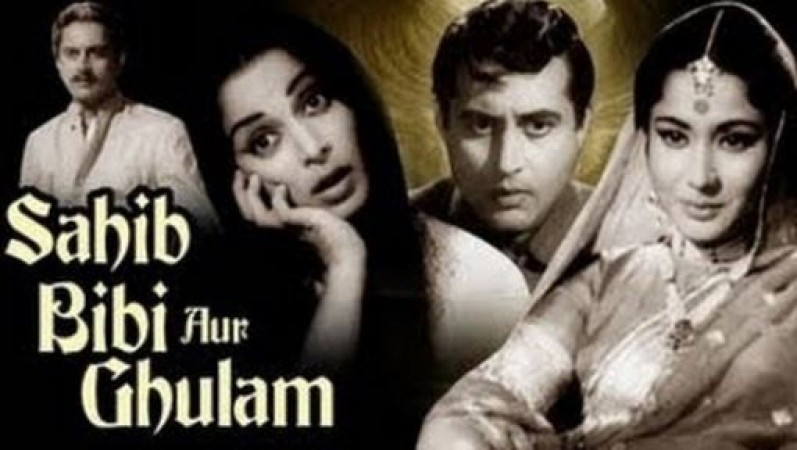
Guru Dutt is regarded as a legendary figure in the history of Indian film and is renowned for his creative storytelling and mastery of the big screen. His 1962 film "Sahib Bibi Aur Ghulam" is regarded as a masterpiece that examines the complexities of interpersonal relationships against the backdrop of a collapsing feudal society. The Academy of Motion Picture Arts and Sciences expressed displeasure with the portrayal of a woman who drinks in a letter to Guru Dutt, which hampered the movie's path to the Oscars. This incident highlighted the pronounced cultural perception and norm differences that existed at the time between Hollywood and Bollywood.
The film "Sahib Bibi Aur Ghulam," which was adapted from the same-titled Bengali novel by Bimal Mitra, was a triumph of cinematic achievement. The story centres on the tragic life of Chhoti Bahu, a young woman brilliantly portrayed by Meena Kumari in the movie directed by Guru Dutt, who also had a significant role in it. The movie, which takes place in 19th-century Calcutta, explores the decadence of the feudal system and the lives of the aristocracy.
"Sahib" is used to refer to the husband, "bib" to refer to the wife, and "ghulam" to refer to the servant. Alcohol is a source of comfort for Chhoti Bahu, a lonely and abandoned wife—a novel and risky theme for Indian cinema in the early 1960s. Her journey into alcoholism is a moving depiction of a woman's struggle to define herself and find meaning in a world where men predominate.
Contemporary Bollywood productions can't compare to the film's meticulous attention to detail, complex character development, and evocative cinematography. Many people consider "Sahib Bibi Aur Ghulam" to be a cinematic masterpiece and a turning point in Indian cinema history.
Visionary filmmaker Guru Dutt, who loved to experiment, wasn't satisfied with just finding success in India. He chose to enter "Sahib Bibi Aur Ghulam" as India's official entry for the 35th Academy Awards in the Best Foreign Language Film category in an effort to gain recognition on a global scale.
The decision by Guru Dutt to submit the movie for an Oscar was warmly received in India. When a letter from the Academy of Motion Picture Arts and Sciences arrived, the journey, however, took an unexpected turn. The Academy raised objections to the way Chhoti Bahu's alcoholism was portrayed in this letter. The letter claimed that it was against their cultural norms and potentially offensive to show a woman drinking alcohol.
This incident demonstrates the pronounced cultural divide that existed at the time between Bollywood and Hollywood. Hollywood did not view the depiction of characters drinking alcohol, including women, as taboo. In fact, drinking was frequently incorporated into American films as a plot device or character trait. Contrarily, Indian cinema, which is steeped in traditional values and social conventions, rarely shows women drinking alcohol, especially when it is the main theme.
Guru Dutt had to make a challenging choice. On the one hand, he thought "Sahib Bibi Aur Ghulam" was a piece of art deserving of acclaim on a global scale. On the other hand, he didn't want to alter the integrity of his film significantly in order to appease the Academy.
Guru Dutt responded to the Academy's letter in a thoughtful and reflective manner, outlining the film's cultural context. He contended that Chhoti Bahu's alcoholism was not depicted in a light-hearted or offensive way, but rather as a reflection of her inner turmoil and the oppressive social pressures placed on her. He thought that the film's exploration of this theme was essential to the story and the growth of the characters.
In the end, "Sahib Bibi Aur Ghulam" failed to receive an Oscar nomination and was not included on the list of top contenders. The film's exclusion from the nominations may have been influenced by Guru Dutt's decision to uphold the artistic integrity of his creation and his refusal to edit the movie to appeal to Western sensibilities.
Despite not being nominated for an Oscar, "Sahib Bibi Aur Ghulam" is still regarded as one of the greatest films ever made in India. The film was ahead of its time in terms of exploring complex characters and taking a daring stance on societal issues. Guru Dutt's unwavering dedication to his craft is demonstrated by his refusal to compromise the integrity of his creations in order to gain international recognition.
The incident also raised issues of cultural sensitivity and the difficulties faced by filmmakers attempting to unite various cinematic traditions. It emphasised how crucial it is to comprehend and respect cultural quirks when telling stories.
"Sahib Bibi Aur Ghulam" by Guru Dutt is a priceless work of art that crosses all barriers of time and culture. Its journey to the Oscars and the letter that followed from the Academy serve as an important reminder of the potential for cultural clashes in the film industry. Even though the movie didn't win an Oscar or receive widespread praise abroad, it cemented its reputation as a classic piece of Indian cinema. Guru Dutt continues to inspire filmmakers and moviegoers all over the world with his unwavering dedication to his vision and his refusal to budge from his artistic tenets.
Manoj Bajpayee's Man Singh Chronicles
Konkona Sen Sharma and Irrfan Khan's Evolution in Love Stories